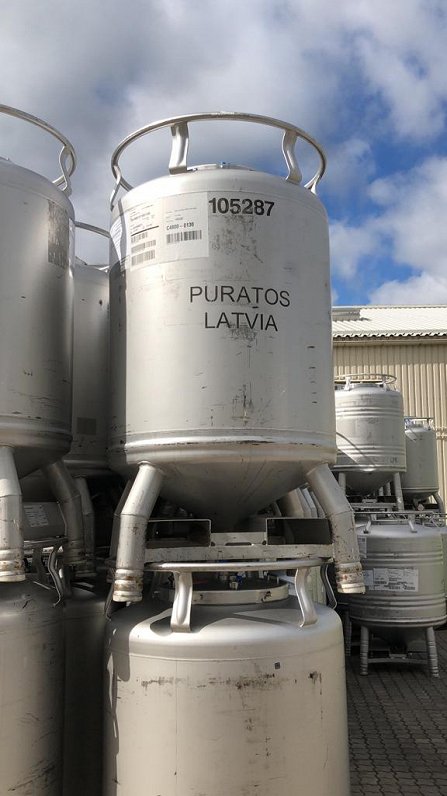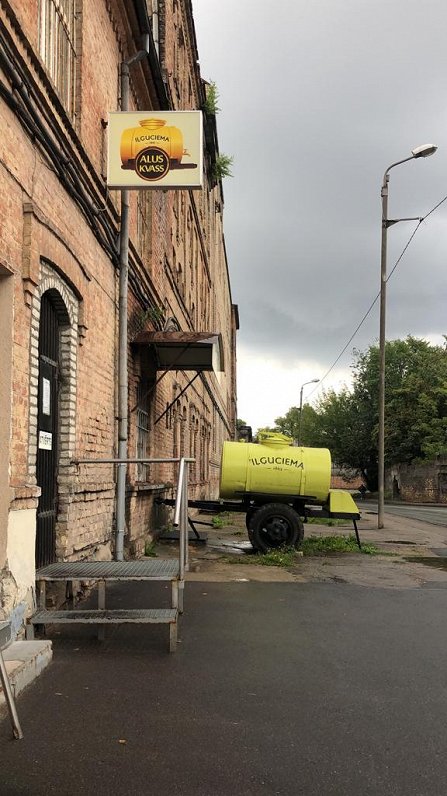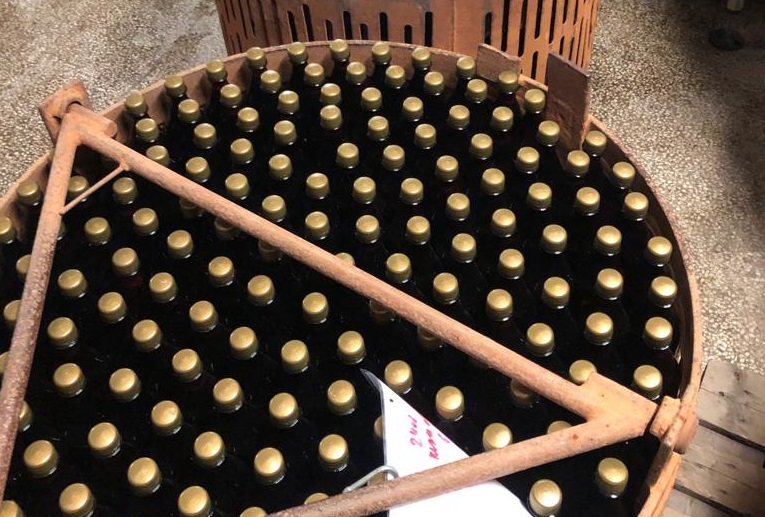Reporter Linda Zalāne visited two companies, food firm Puratos Latvia and brewer Ilgezeem to find out why they, and more than 300 other companies, have chosen to maintain business links with Russia and Belarus. It's important to note at the outset that neither company exports items on U.S. or EU sanctions lists, so they are not breaking any laws. The question is one of morality and business ethics versus markets and the bottom line.
Located in Pūre, Tukums district – which has long been famous in Latvia for its high-quality fresh produce – is the company Puratos Latvia. It was formerly known as 'Pūre Food' but for the last ten years has been owned by Belgian company Puratos Group.
The parent company continues to do business in Russia and appears to plan on doing so far into the future regardless of events in Ukraine – it recently held a seminar about its plans for the Russian market in 2024.

Its Latvian operation is a major employer and taxpayer in the Tukums area. General Director Aigars Balodis showed Latvian Radio's reporter around the impressive modern production facility, pointing out that around 70% of production is destined for export. The jams produced in Pūre are exported to around twenty countries in the world – including Russia.
At this point Latvian Radio's reporter gets down to some tough questions.
Linda Zalāne: How important is the market of Russia and Belarus?
Aigars Balodis: It is significant enough that the immediate cessation of exports would negatively affect both jobs in our company and also cause financial losses.
Linda Zalāne: What does 'significant enough' mean? How much of the total export volume is the Russian market?
Aigars Balodis: I will not mention specific numbers.
Linda Zalāne: Is it [more than] half of the export volume, less than half?
Aigars Balodis: I will stick to the wording that it is 'significant enough'.
According to Balodis, the last load of jam produced in Pūre was sent to Russia at the beginning of summer – more than a year after Russia launched its invasion. The company is currently not looking for new business partners in Russia, but adds that "Actually, Belarus is the only market where we continue cooperation in volumes that are noticeable."
Linda Zalāne: After the start of the war, were there discussions within the company about what to do about the Russian market?
Aigars Balodis: In this case, a decision was made that we are looking to develop new markets.
Asked several times if the company didn't consider stopping exports to Russia for ethical reasons, Balodis answered: "As I mentioned, I will refrain from commenting."
According to him, continuing to export to Russia is simply a rational business decision.
Aigars Balodis: "I think that both our employees and Latvia benefit from what we are doing now. There are various other ways we can help Ukraine defeat Russia, because right now I think it's an emotional decision, but I think there are decisions that need to be made rationally.
Linda Zalāne: And continuing exports is a rational decision?
Aigars Balodis: As I mentioned, in the short term it is a rational decision.
But Balodis also insists that Puratos is taking practical measures to support Ukraine, independent of its dealings with Russia and Belarus.
Aigars Balodis: We have created a special fund in Ukraine to support bakers and confectioners. Puratos has a production plant in Odessa, which has also suffered during the war, and the company has helped people find work in other countries... I think the main thing right now is that we don't need to make emotional decisions and we need to look at it with a practical, rational side. We are in the European Union, where all countries have the same rules.

Another company that has not stopped exporting to Russia both last year and this year is the beverage producer Ilgezeem. It is a major brand that has products available in practically every grocery store in the country via its popular Iļguciema kvass and beers. According to its corporate website "We are devoted to making our products as a benchmark of quality, meanwhile sticking to our traditions and ancient recipes. We highly value opinions and needs of our customers."
Based in Rīga, on Daugavgrīvas Street, this time reporter Linda Zalāne was shown around the facility by Rihards Jablokovs, head of the sales and marketing department of SIA Ilgezeem, who pointed out the company's latest beer.
Ilgezeem products are sold not only in Latvian stores, but also in other countries. The main markets are Germany, Poland and Estonia. Exports account for around 20% of production. The company also exports to Russia and has continued to do so after the February 24, 2022 invasion of Ukraine.
Linda Zalāne: How much did the company export to Russia last year and this year?
Rihards Jablokovs: 2% throughout the year. Insignificant.
Linda Zalāne: In 2022?
Rihards Jablokovs: Yes, 2.1%, to be precise. The last shipment to Russia was in January of this year. Seven months ago. It was an order that had been placed two months earlier. But that customer stopped placing orders.
Linda Zalāne: But does that mean that you did not have a strict position – 'No' to the Russian market?
Rihards Jablokovs: We watched what was happening. Those events started. But does a person develop an opinion in one day? It's his choice. One makes a conclusion in one day, another after a month, the third after half a year.
The Latvian Radio reporter presses the question – didn't the company consider the possibility of breaking export ties with Russian partners after the war started by Russia in Ukraine?
Rihards Jablokovs: Well look, about the war. We all use gas at home, but where do we buy it from? From Russia. So all of us fearless patriots should stop cooking. You don't need everything.
Linda Zalāne: There was no choice but to export to Russia?
Rihards Jablokovs: Yes and no, if we get to save our company and they pay us the money we need at that moment. And when it all started, it's not like exports ended in one day. Some orders were placed, to be fulfilled, but [now] everything has stopped. Everything.
Rihards Jablokovs no longer sees the possibility that Ilgezeem products could be exported to Russia in the future, saying: "It was a promising market, but now, seeing what has happened – it's over. It has been crossed out. We have no prospects, no plans."
Companies exporting directly to Russia and Belarus are one thing and may generate disapproval among many of their customers, but as Latvian Radio's investigation of business links between Latvia and the sanctioned warmongering regimes reveals, at least those companies are open about their export links. Data showing massive increases of exports to countries in central Asia bordering Russia suggests that significant trade with Russia is simply being diverted via intermediaries – and that in some cases the goods involved may be more useful to the Russian war machine than jams and kvass.































